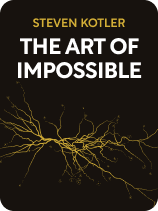

This article is an excerpt from the Shortform book guide to "The Art of Impossible" by Steven Kotler. Shortform has the world's best summaries and analyses of books you should be reading.
Like this article? Sign up for a free trial here .
What is the meaning and importance of intrinsic motivation? Why are intrinsically motivated people usually more successful?
Neuroscientist and bestselling author Steven Kotler studied elite performers to understand how they achieve seemingly impossible goals. In Kotler’s book, The Art of Impossible, he explains the importance of intrinsic motivation and how it underpins whether you stick with your goals or give up when feeling overwhelmed.
Keep reading to learn the importance of intrinsic motivation, according to Kotler.
Importance of Intrinsic Motivation in the Brain
According to Kotler, intrinsically motivated goals generate more pleasurable neurochemicals than extrinsically motivated goals. This is because intrinsically motivated goals align with your interests and passions—you choose to pursue these goals and improve your capabilities because they inspire positive emotions and you genuinely enjoy working toward them. Kotler argues that intrinsic motivation is important because you’re more likely to practice full engagement and cultivate peak performance habits if you feel intrinsically motivated.
When discussing the importance of intrinsic motivation, Kotler explains that two types of motivation drive your decisions, behaviors, and habits:
- Extrinsic motivation: You do things to receive external rewards such as money, fame, or social validation.
- Intrinsic motivation: You do things to receive internal rewards such as feelings of interest, enjoyment, or happiness.
Each time you work toward an intrinsically motivated goal, your feelings of enjoyment trigger a flood of reward neurochemicals (such as dopamine and serotonin) to enter your system and further increase your pleasure. As a result, you associate working toward your goals with pleasurable feelings—and this reinforces your motivation to pursue these goals.
On the other hand, extrinsically motivated goals generally feel less enjoyable to pursue because they don’t align with your interests or inspire positive emotions. As a result, they don’t trigger the necessary reward neurochemicals that drive you to achieve your goal.
Therefore, before you attempt to achieve a seemingly impossible goal, it’s important to have intrinsic motivation to tackle it.
| Importance of Intrinsic Motivation When Identifying Goals Many psychologists and self-improvement authors mirror Kotler’s argument that cultivating intrinsic motivation is key to feeling engaged, achieving goals, and experiencing satisfaction. Some notable proponents of this theory include: Jay Shetty (Think Like a Monk), Neil Pasricha (The Happiness Equation), Maxwell Maltz (Psycho-Cybernetics), and Deepak Chopra (The Seven Spiritual Laws of Success). The authors of Minimalism expand on the topic with additional advice that will help you identify your motivations and move toward more intrinsically motivated goals. They claim that there are four obstructions holding you back from pursuing intrinsically motivated goals: identity, status, certainty, and money. For example, you may focus on career goals that drain your energy rather than trying to find goals that align with your interests because your financial security and sense of identity are tied up with your career status. Become aware of how these obstructions influence you, and distinguish between the goals and activities that satisfy you (intrinsically motivated) and the ones that don’t (extrinsically motivated), by tracking all of the activities you take part in over the next few weeks. Next, reflect on each activity by asking yourself the following questions: – Is this something I want to do, or am I fulfilling external expectations? – Do I enjoy this? If so, what’s the most enjoyable aspect of it? – Does this make me feel energized or drained? Motivated or unmotivated? – How can I create opportunities to engage more in the activities that I enjoy? |

———End of Preview———
Like what you just read? Read the rest of the world's best book summary and analysis of Steven Kotler's "The Art of Impossible" at Shortform .
Here's what you'll find in our full The Art of Impossible summary :
- A look at how some people can achieve seemingly impossible feats
- How to make your dreams more attainable
- A step-by-step process for developing peak performance habits






